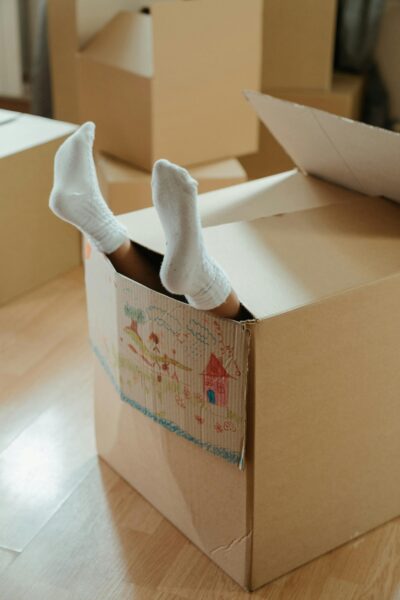In the arts and entertainment industry, moving is often a fact of life — whether it’s for a new theater production, film shoot, or seasonal gig.
For many creative professionals, the process can feel chaotic and overwhelming.
What follows are some helpful tips to make sure the process unfolds smoothly.
- Build a Timeline Around Your Project Schedule
Timing is everything. As a creative professional, you’re often working with tight deadlines, so building a moving timeline that revolves around your project schedule is super important. We recommend you start by listing your upcoming commitments and setting ideal move dates that work with your rehearsal schedules, performance days, or filming hours. For example, if you have a week off between gigs, that could be the perfect time to get the bulk of your move completed without disrupting your work.
For best results, break down the moving process into manageable tasks, such as decluttering, packing, and setting up utilities. Then, set specific dates to complete each task on your timeline, giving yourself enough buffer time to handle any unexpected obstacles.
If your work hours are intense, consider hiring professional movers for the bulk of the work so you can focus on your deadlines.
- Pack Smart and Protect Your Gear
In the entertainment industry, you likely have specialized equipment, costumes, or other valuable items that need extra care. Packing efficiently and securely can make a world of difference in keeping your belongings protected.
Start by organizing and categorizing your items based on their purpose (e.g., stage gear, wardrobe, tech equipment). Use high-quality packing materials, like bubble wrap, to protect fragile items, and invest in sturdy boxes that can handle heavier loads.
For delicate costumes or fabric pieces, garment bags can prevent damage or wrinkling during transport. If you have electronics, use their original packaging if possible. Otherwise, ensure they’re padded and placed in waterproof containers. Label boxes clearly and mark anything fragile so you (or movers) can handle them with care.
- Consider Portable Storage Options
If you’re in between gigs or just need temporary storage, a portable storage unit can be a lifesaver. Portable storage companies deliver a container to your location, which you can pack at your own pace. Once packed, the storage company can pick it up and hold it until you’re ready to retrieve it. This option allows you to keep your items safe without cluttering your living space or carrying everything from location to location.
This flexibility can be especially useful if your new gig has uncertain dates or your accommodations vary by project. For example, if you’re spending a few months in one city for a play or film, storing items you won’t need until your next move means fewer things to keep track of. This way, you can travel lighter while knowing your items are safe and accessible when you need them.
- Weigh the Benefits of Professional Movers vs. DIY
If you’re juggling work demands or moving across the country, professional movers can be worth the investment. They handle the heavy lifting, packing, and driving, which lets you focus on the job that’s bringing you to your new city. Some moving companies even specialize in working with artists and creatives, understanding the special care required for delicate or high-value items.
However, if budget is a concern, a DIY approach can be a great alternative. Renting a moving truck and packing things yourself can save you money, especially for shorter moves. If you have friends or colleagues in the area who can lend a hand, moving on your own can also be a bonding experience and a chance to say goodbye to your community. Just remember that going DIY requires more time and effort, so plan accordingly and be realistic about your energy levels during the move.
- Use Digital Tools for Planning and Organizing
Digital tools can make managing your move simpler and more organized. Using any number of project management apps, you can track tasks, set reminders, and update deadlines, which makes it easy to stay on top of your to-do list. Moving expense apps can also be useful for tracking costs and sticking to a budget, so you can see where your money is going and avoid overspending.
For inventorying your belongings, consider apps that allow you to document and categorize each box. This can save time when unpacking or if you need to quickly locate an item. Moving is much easier when you’re organized, and these tools can give you peace of mind that everything’s on track.
- Prioritize Self-Care During the Move
It’s easy to get so caught up in the logistics of moving that you neglect your own well-being. But managing stress is key to this entire process, especially when you’re preparing for a demanding project or adjusting to a new city. Take regular breaks, hydrate, and make sure you’re eating balanced meals to stay energized throughout the move. Scheduling downtime can also help you unwind and keep burnout at bay.
- Familiarize Yourself with Your New Area
Once you arrive, take some time to get to know your new surroundings. If possible, scope out the local grocery stores, coffee shops, gyms, or parks ahead of time to ease your transition. Find out where local performance venues, galleries, or rehearsal spaces are located, too – this can help you get connected with your new community and make the area feel more like home.
Enjoy a Stress-Free Move
Moving doesn’t have to be painful. If you’re smart and strategic in your approach, it could actually be an exciting start to your next chapter. Make sure you plan ahead and are smart about your approach. The seven tips above will help!



{ 1 comment… read it below or add one }
Great article! As a creative professional, I completely agree with the advice on timing moves around project breaks—it’s a game-changer. I recently came across MyMovingReviews, and their info on average moving costs—like $1,680 for local moves or $2,363–$6,885 for long-distance—was super helpful for budgeting. Packing gear and costumes carefully is a must, and the tip on using portable storage is so practical. Thanks for the helpful insights!